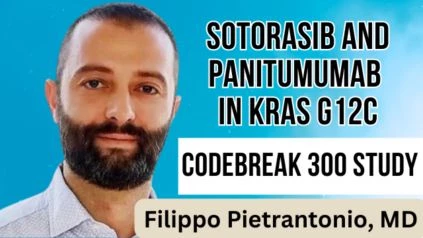Date: 11/14/2023
Clinical data from the study demonstrated the inhibition of feedback reactivation pathways with an accumulation of activated GFR, providing a compelling rationale for combining Sotorasib with an anti-EGFR monoclonal antibody. Dr. Pietrantonio, MD, emphasized the need to enhance outcomes beyond monotherapy.
The CodeBreak 300 trial, a global and phase 3 active-controlled open-label study, involved 160 patients randomized based on centrally confirmed KRAS G12C mutations after the failure of standard therapies. The trial featured three arms: Sotorasib at the standard dose (960 mg) plus panitumumab, Sotorasib at a lower dose (240 mg) plus panitumumab, and investigator’s choice therapy with trifluridine/tipiracil or regorafenib.
The primary endpoint, progression-free survival (PFS), was met, with significant improvements observed in the Sotorasib plus panitumumab arms compared to investigator’s choice. Median PFS was 2.2 months in the investigator’s choice arm, 3.9 months with Sotorasib 240 mg plus panitumumab, and 5.6 months with standard Sotorasib 960 mg plus panitumumab after a median follow-up of 7.8 months.
Moreover, the overall response rate and disease control rate increased with both standard and lower doses of Sotorasib plus panitumumab compared to investigator’s choice. The safety profile of the combination was manageable, with no new safety signals and no treatment-related deaths. Common treatment-related adverse events included skin rash, dermatitis, acneiform rash, hypomagnesemia, and diarrhea.
In conclusion, Filippo Pietrantonio, MD, underscored that Sotorasib, especially at the standard dose of 960 mg plus panitumumab, not only demonstrated efficacy and activity in metastatic colorectal cancer but also emerged as a potential new standard of care therapy for patients with refractory KRAS G12C-mutated metastatic colorectal cancer.

